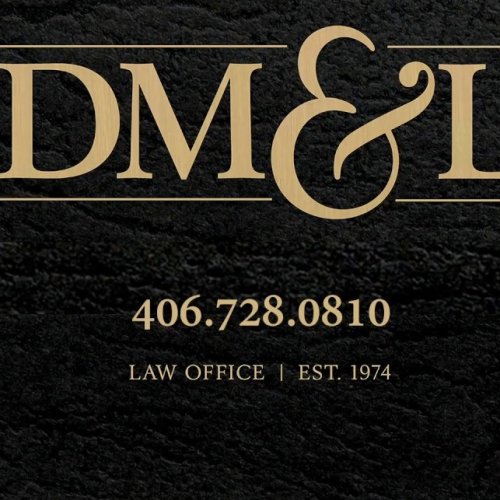Best Arrests & Searches Lawyers in Montana
Share your needs with us, get contacted by law firms.
Free. Takes 2 min.
Or refine your search by selecting a city:
List of the best lawyers in Montana, United States
About Arrests & Searches Law in Montana, United States
Arrests and searches play a crucial role in criminal law enforcement in Montana, United States. They dictate when police officers can detain a person or search property, and what legal procedures must be followed to balance public safety with individual rights. These laws are based on both federal and state constitutions, statutes, and court decisions. Understanding the basics of these laws is important if you find yourself or a loved one involved in a criminal investigation or police encounter.
Why You May Need a Lawyer
There are several situations in which you may need legal help with arrests and searches in Montana. If you are arrested or if law enforcement searches your home, car, or personal belongings, you may not know your rights or what steps you should take. Mistakes by law enforcement can sometimes result in unlawful searches or arrests, and evidence obtained illegally could be challenged in court. Having an attorney can help you protect your rights, ensure proper legal procedures are followed, and potentially suppress evidence that was gathered improperly.
Common scenarios where people seek legal help include:
- Being taken into custody or detained by law enforcement
- Experiencing a search of home, vehicle, or personal property
- Facing criminal charges after an arrest or search
- Believing your rights were violated by police actions
- Needing assistance with expungement of arrest records
Local Laws Overview
Montana’s arrests and searches laws are shaped by both the Montana Constitution and federal law, especially the Fourth Amendment of the U.S. Constitution. Law enforcement typically needs “probable cause” to make an arrest or request a search warrant from a judge. This standard requires sufficient facts to believe that a crime has occurred and that the person or place to be searched is connected to the crime.
Some important aspects of Montana law include:
- Police must generally have a warrant to conduct a search, with exceptions such as “search incident to arrest,” consent, or exigent circumstances where public safety is at risk.
- A warrantless arrest is allowed if an officer has probable cause to believe a person has committed, is committing, or is about to commit a crime in their presence.
- Officers must inform individuals of their rights if taken into custody, commonly known as “Miranda rights.”
- Montana law provides additional privacy rights, including protections for electronic data and communication.
- Any evidence obtained through illegal searches or arrests may be challenged and possibly excluded from court proceedings.
Frequently Asked Questions
What is “probable cause” in Montana?
Probable cause means law enforcement must have a reasonable basis, based on facts or evidence, to believe that a crime was committed and the person or place to be searched is linked to that crime.
Do police always need a warrant to search my property?
Not always. While a warrant is generally required, exceptions include consent, search incident to a lawful arrest, plain view, and urgent situations where waiting for a warrant could risk harm or evidence destruction.
What should I do if I am arrested?
Remain calm. Do not resist or argue. Request to speak with an attorney and do not answer questions or make statements until your lawyer is present.
Can I refuse a search of my home or car?
Yes, if the officer does not have a warrant, you can refuse a search. However, refusal must be clear and respectful. There are some exceptions where the police can search without your permission.
What are Miranda rights?
Miranda rights inform you of your right to remain silent and your right to an attorney when you are taken into custody and questioned. Police must advise you of these rights before conducting a custodial interrogation.
What happens if my rights are violated during an arrest or search?
If your rights are violated, an attorney can challenge the legality of the arrest or search in court. Evidence gathered improperly may be excluded from trial, and in some cases, charges could be dropped.
Can the police arrest me without seeing me commit a crime?
Yes. Police can arrest you without witnessing a crime if they have probable cause to believe you have committed a crime based on reliable evidence or investigation.
Are records of arrest public in Montana?
Arrest records are generally public, but certain cases, such as those involving juveniles or sealed records, may be confidential.
How do I expunge or seal an arrest record in Montana?
You may petition the court for expungement in some circumstances. Expungement is not available for all offenses, and legal assistance is often necessary to navigate the process.
What should I do if I believe a search or arrest was unlawful?
Contact an experienced criminal defense attorney immediately. They can review your case, advise on your rights, and represent your interests in court.
Additional Resources
Individuals seeking more information or assistance can turn to several helpful Montana-based and national organizations, including:
- Montana Office of the State Public Defender
- Montana Legal Services Association
- American Civil Liberties Union of Montana
- Montana Law Help
- Montana Department of Justice
- Your Local County Public Defender Office
These organizations can provide information, resources, or in some cases, direct legal assistance or referrals.
Next Steps
If you or someone you know needs legal help for arrests and searches in Montana, it is important to act quickly to protect your rights. Start by documenting all details related to the arrest or search, including the names of officers involved, witnesses, and any documents or warrants presented. Seek a qualified Montana criminal defense attorney as soon as possible. Many attorneys offer free initial consultations to review your case. Use the resources listed above to find professional legal assistance. Having an advocate experienced in Montana’s arrests and searches laws greatly increases your chances of a fair outcome.
Remember, the law is complex, and each case is unique. Professional legal guidance is the best way to ensure your rights are protected during any encounter with law enforcement.
Lawzana helps you find the best lawyers and law firms in Montana through a curated and pre-screened list of qualified legal professionals. Our platform offers rankings and detailed profiles of attorneys and law firms, allowing you to compare based on practice areas, including Arrests & Searches, experience, and client feedback.
Each profile includes a description of the firm's areas of practice, client reviews, team members and partners, year of establishment, spoken languages, office locations, contact information, social media presence, and any published articles or resources. Most firms on our platform speak English and are experienced in both local and international legal matters.
Get a quote from top-rated law firms in Montana, United States — quickly, securely, and without unnecessary hassle.
Disclaimer:
The information provided on this page is for general informational purposes only and does not constitute legal advice. While we strive to ensure the accuracy and relevance of the content, legal information may change over time, and interpretations of the law can vary. You should always consult with a qualified legal professional for advice specific to your situation.
We disclaim all liability for actions taken or not taken based on the content of this page. If you believe any information is incorrect or outdated, please contact us, and we will review and update it where appropriate.
Browse arrests & searches law firms by city in Montana
Refine your search by selecting a city.










